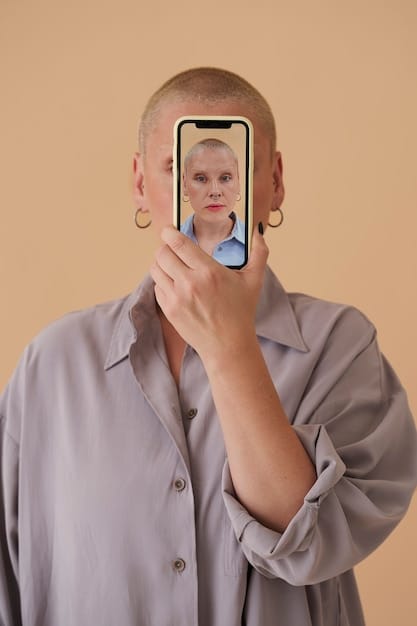Is Social Media Affecting Your Mental Health? A 2025 Guide

Is Your Social Media Use Affecting Your Mental Health? A 2025 self-assessment guide offers tools and insights to evaluate the impact of social media on your well-being, helping you make informed decisions for a healthier digital lifestyle.
Are you scrolling more than smiling? It’s time to check: Is Your Social Media Use Affecting Your Mental Health? A 2025 Self-Assessment Guide can help you find out.
Understanding the Social Media Landscape in 2025
The social media landscape in 2025 is vastly different from its earlier iterations. It’s more immersive, more personalized, and arguably, more pervasive in our daily lives. To understand how it might be affecting your mental health, we need to first grasp the current state of these platforms.
Think of the evolving algorithms, the rise of short-form video content, and the increasing integration of AI in content curation. These elements all contribute to a unique environment with both benefits and potential drawbacks.
The Algorithm Effect
Algorithms are designed to keep you engaged, often by showing you content that confirms your existing beliefs or stirs up emotions. This can lead to echo chambers and filter bubbles, limiting your exposure to diverse perspectives and potentially increasing polarization.
The Rise of Short-Form Video
Platforms like TikTok and Instagram Reels have popularized short-form video content. While entertaining, these bite-sized pieces can lead to shorter attention spans and a constant craving for instant gratification.
- Recognizing the potential impact of algorithms on your worldview.
- Being mindful of the amount of time spent consuming short-form video content.
- Actively seeking out diverse perspectives and sources of information.
The key is to be an informed and conscious user, aware of the tactics employed by social media platforms to capture and maintain your attention. By understanding these dynamics, you can start to assess how they might be influencing your mental well-being.

Identifying Symptoms: How Social Media Impacts Mental Health
Social media’s impact on mental health can manifest in various ways, sometimes subtly and other times more overtly. Recognizing these symptoms is the first step in taking control of your digital habits and safeguarding your well-being.
It’s important to remember that everyone’s experience is unique. What affects one person negatively might not have the same impact on another. However, there are some common warning signs to watch out for.
Increased Anxiety and Stress
The constant stream of information, the pressure to maintain a perfect online persona, and the fear of missing out (FOMO) can all contribute to increased anxiety and stress levels.
Sleep Disturbances
Scrolling through social media before bed can disrupt your sleep patterns. The blue light emitted from devices can interfere with melatonin production, making it harder to fall asleep and stay asleep.
- Becoming aware of your own emotional reactions to social media content.
- Tracking your sleep patterns and identifying any correlations with social media use.
- Creating a buffer between social media and bedtime.
By being mindful of these potential symptoms and diligently tracking your own experiences, you can gain valuable insights into whether social media is having a detrimental effect on your mental health.
The 2025 Self-Assessment: Questions to Ask Yourself
Taking a proactive approach to assess your relationship with social media is essential. By asking yourself the right questions, in 2025, you can gain clarity and determine whether your usage patterns are contributing to any mental health challenges.
Consider this self-assessment as a regular check-up, a way to stay in tune with your emotional and mental well-being in the digital age.
Do I feel compelled to check social media constantly?
A compulsive need to check social media, even when you know you should be doing something else, can be a sign of dependence.
Am I comparing myself to others online?
Constant comparison to the curated lives of others on social media can lead to feelings of inadequacy and low self-esteem.
This self-assessment is not about judging yourself or your habits. It’s about gaining awareness and understanding, empowering you to make informed choices about your social media usage.

Setting Boundaries: Creating a Healthier Social Media Diet
Creating boundaries is key to fostering a healthier relationship with social media. It’s about consciously choosing how, when, and why you engage with these platforms, ensuring that they serve your needs rather than control your life.
Remember, setting boundaries is not about complete abstinence. It’s about finding a balance that supports your mental well-being and allows you to enjoy the positive aspects of social connection without succumbing to the negative effects.
Time Limits
Setting daily or weekly time limits for social media use can help you regain control over your time and attention.
Mindful Engagement
Before you post, comment, or share, ask yourself why you’re doing it. Are you seeking validation? Are you trying to impress others? Are you genuinely contributing to the conversation?
- Using built-in app timers or third-party apps to track and limit your time on social media.
- Creating designated “social media-free” zones in your home or during certain activities.
- Prioritizing real-life interactions and experiences over online engagement.
By implementing these strategies, you can create a healthier social media diet that supports your mental well-being and empowers you to live a more balanced and fulfilling life.
Finding Balance: Integrating Social Media with Real Life
The key to a healthy relationship with social media lies in integration, not isolation. It’s about finding ways to incorporate these platforms into your life in a way that complements and enhances your real-world experiences, rather than detracting from them.
Balance doesn’t mean completely eliminating social media. It means being intentional about your usage and prioritizing real-life connections and activities.
Prioritize Real-Life Connections
Make a conscious effort to spend more time with friends and family in person. Engage in activities that bring you joy and fulfillment, whether it’s hobbies, sports, or creative pursuits.
Use Social Media for Good
Follow accounts that inspire you, educate you, or make you laugh. Engage in positive and supportive online communities.
It’s about consciously choosing to use social media as a tool for connection, learning, and personal growth, rather than allowing it to become a source of stress, anxiety, or comparison.
Seeking Support: When to Ask for Help
It’s okay to ask for help. If you’re struggling with the impact of social media on your mental health, don’t hesitate to reach out to a trusted friend, family member, or mental health professional.
Remember, seeking support is a sign of strength, not weakness. It’s an acknowledgment that you’re prioritizing your well-being and taking steps to address any challenges you may be facing.
Talking to a Therapist
A therapist can provide you with a safe and supportive space to explore your relationship with social media and develop coping strategies.
Joining a Support Group
Connecting with others who are experiencing similar challenges can provide you with a sense of community and validation.
Your mental health is a priority. Don’t let social media come at the expense of your well-being.
| Key Point | Brief Description |
|---|---|
| 📱 Awareness of Use | Understand how much time you spend and what content you consume. |
| ⏰ Setting Time Limits | Allocate specific times for social media to maintain balance. |
| 💖 Prioritize Real Life | Engage more in activities that bring direct personal satisfaction. |
| 🤝 Seek Support | Consult a mental health professional as needed for guidance. |
Frequently Asked Questions
▼
Look for signs like increased anxiety, sleep disturbances, constant comparison to others, and feeling compelled to check social media frequently. If these symptoms persist, it’s a good idea to reassess your social media habits.
▼
Try setting time limits, muting or unfollowing accounts that trigger negative emotions, and practicing mindful engagement. It’s also helpful to prioritize real-life interactions and hobbies over online activity.
▼
Not necessarily. It’s more about finding a healthy balance. Some people benefit from a complete break, while others can manage with reduced and more mindful usage. Experiment to see what works best for you.
▼
Yes, it can. Social media can provide connection, support, and access to valuable information. By curating your feed and engaging in positive communities, you can leverage social media for good.
▼
If you are struggling to manage your social media use, experiencing significant distress, or if social media is interfering with your daily life, it’s time to seek professional help from a therapist or counselor.
Conclusion
In conclusion, understanding is your social media use affecting your mental health? A 2025 self-assessment guide serves as a valuable tool for evaluating and managing your digital well-being. By staying informed, setting boundaries, and prioritizing real-life connections, you can harness the power of social media without compromising your mental health. If challenges persist, don’t hesitate to seek professional support, ensuring a balanced and fulfilling life in the digital age.





